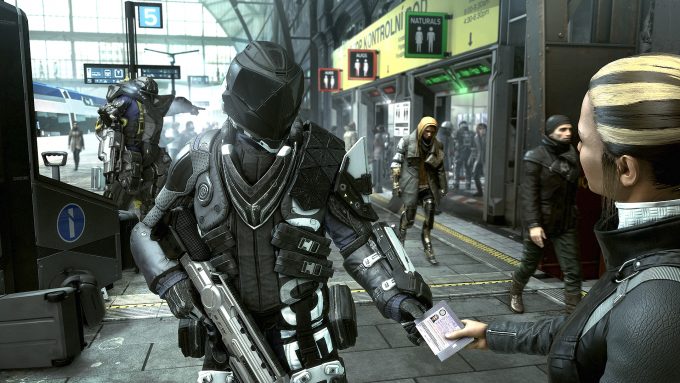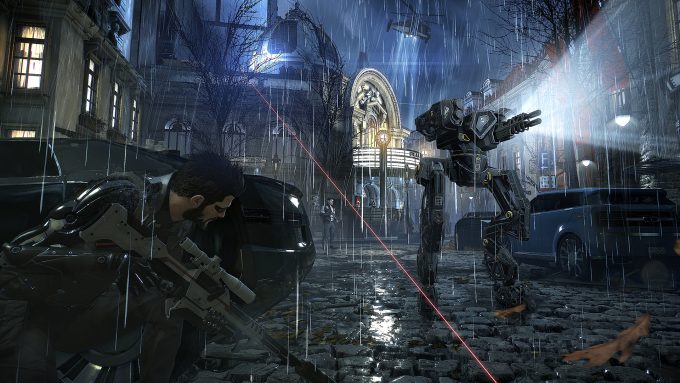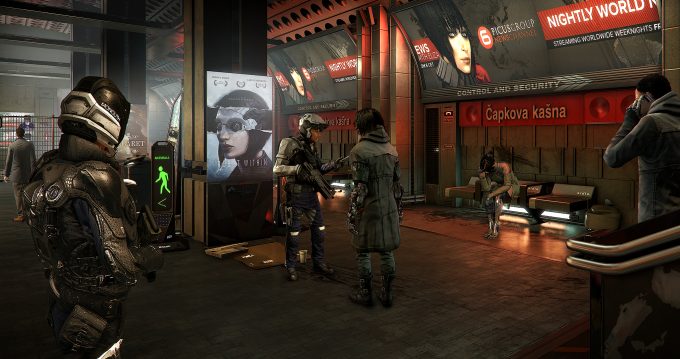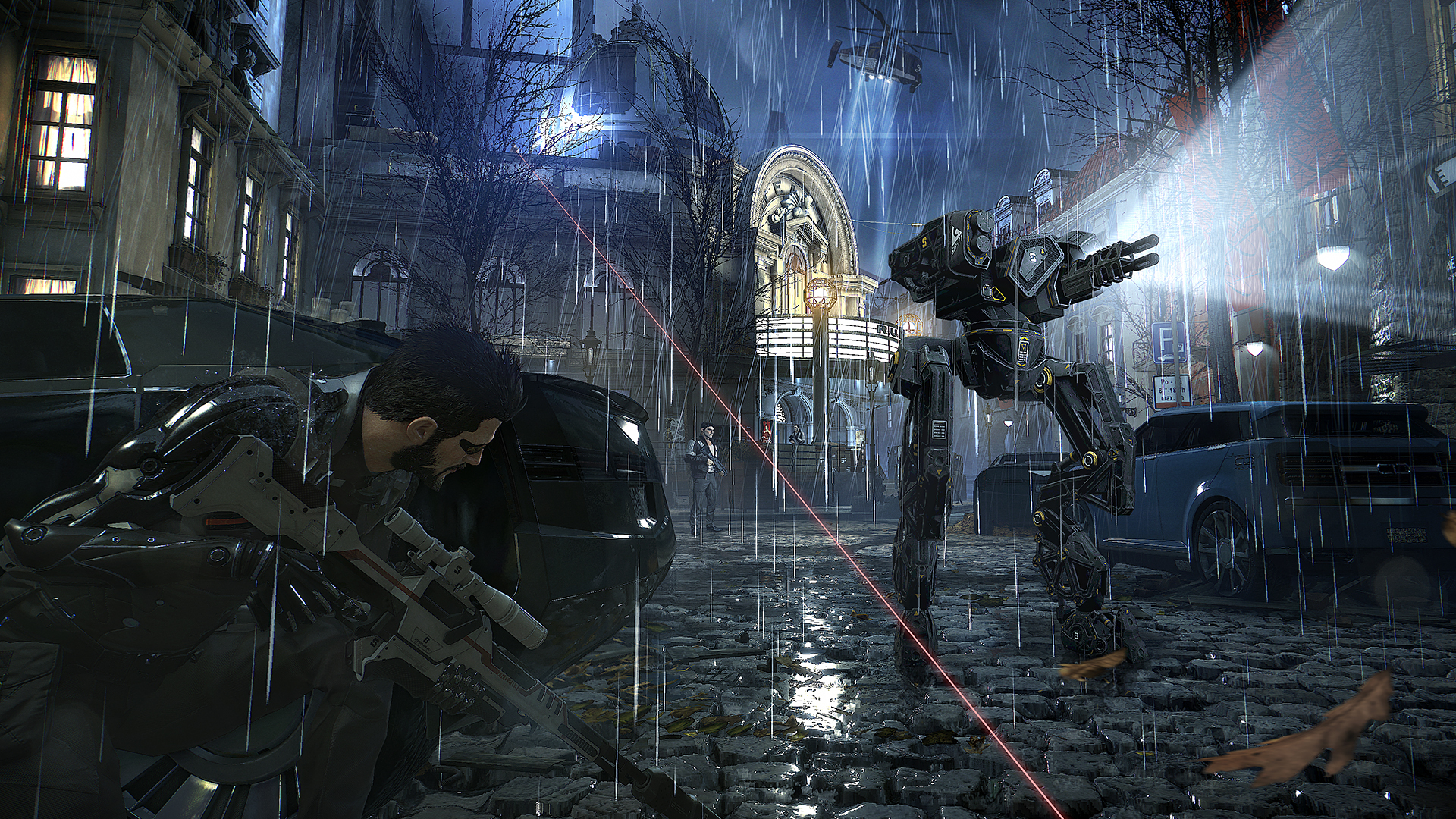Since 2000, the Deus Ex series has always been about choices — not just capital “C” choices about morality made through dialogue options, but choices about what kind of game you want to play.
As the successor to 2011’s Deus Ex: Human Revolution, itself a re-invigoration of the venerated cyberpunk series, Eidos Montreal’s action-stealth role-playing game Deus Ex: Mankind Divided more than succeeds in that premise, letting you play the game in just about anyway you like.
Unfortunately, on choices of a grander scale involving the deep, or at least nominally so, discussion of complex issues and conspiracies, Mankind Divided falls just like the mythical Icarus it frequently invokes.
Mankind Divided takes place in Prague in 2029, two years after a future bright with the possibilities offered by cybernetic augmentations has been crushed by “the Aug Incident.” At the end of Human Revolution, every augmented person in the world was driven into a violent psychosis by the flip of a switch from a rogue member of the Illuminati who wanted humanity to turn away from augmentations.
He succeeded. Now, the augmented are feared and hated, and it’s shown in almost every possible way in the game’s version of the Czech city. Segregated housing, transportation, benches, demands for identification and police checkpoints and more evoke some of the worst of real world oppression.

Players take control of Adam Jensen, an ex-cop that was heavily augmented after barely surviving an attack by Illuminati-backed mercenaries in Human Revolution. Over the course of that game, Jensen worked to unravel the Illuminati’s attempts to control the world and played a central role in the Aug Incident himself, but he can’t remember how.
That means the developers reconciled the three possible endings of Human Revolution by giving Jensen what is essentially a factory reset like any smartphone. He still knows the Illuminati were behind it all, and to that end has joined the Janus Collective, an underground group of hackers, to thwart them. He’s also a member of INTERPOL’s Task Force 29, a clandestine agency dedicated to tracking and stopping augmentation-related terrorist attacks.
It’s a complicated web of conspiracies and mixed loyalties that can sometimes verge on the preposterous, but is played so straight and earnestly, just like the first Deus Ex did with it’s long monologues on libertarianism, that it’s still intriguing.
The timely reset on Adam’s augments also provides, along with some more interesting mysteries, sufficient justification for having players re-activate augments he should already have.
Experience points are awarded for nearly any action. Shooting an enemy, making it through a section unseen, reading a book. It all is a great way to make any option viable and useful while encouraging exploration. Stealth definitely awards more points, but I never felt like I was lacking for experience while focusing on combat. Afterwards, Praxis points can be used to activate any of a variety of augments, and the complete array of abilities is arranged in a way that encourages experimentation with all styles of play.

Jensen is controlled primarily through first person perspective, but switches to third when hiding behind cover or engaging in conversation with other characters. This enhances specific modes of play like the augments that affect Jensen himself. I played as stealthily as a carbon-fiber-skinned robot man could be, but I couldn’t depend solely on stealth. Once I’d sneaked past enemies, I relied heavily on hacking augmentations to be able to open doors and continue making my way through. Other times, I’d crawl unnoticed through ventilation shafts, but needed strength upgrades to break through walls at the end of them.
Augmentations like the Titan Shield, which covers Jensen in a shifting veil of what looks like a ferro-magnetic fluid and blocks projectiles, namely bullets, combine with general control refinements like a generous auto-aim to make combat a viable option. Compare that to Human Revolution, where combat and shooting was so maligned that the Director’s Cut edition of the game not only added slight fixes but made it easier to avoid combat entirely.
In addition to the story, there’s also Breach Mode, a score-based challenge mode where you compete with players on your friends lists and leaderboards to get the highest score in small instances of combat and stealth. A typical level requires you to reach secure data storage units, making your way past guards, cameras, turrets, etc., and return to the entrance in the shortest amount of time possible. The same things that grant experience in the main game provide a higher score here, like headshots on enemies or avoiding detection all together. It all takes place in a Tron-like virtual reality setting. There’s also a neat story wrapping around it to keep it in-universe. Unless you’re extremely dedicated to uncovering every little piece of information about the world of Deus Ex or have a real competitive edge, Breach seems like a mostly forgettable diversion.
The world is definitely worth exploring as well. Prague looks beautiful from a pure graphics standpoint, although the “neo-renaissance” design that made Human Revolution so striking isn’t as present. Focusing on Prague on a few smaller locations also means there’s less variety than Human Revolution, which bounced back between future Detroit and Hengsha, China.
Still, almost every nook and cranny in Prague and the other mission-specific locations are navigable and packed with emails, books, radio shows and NPC conversations that give life to the world.
The game also pays attention to more than you might think when it comes to confront you or rewarding you with the results of your actions. After I’d hacked into the emails of all my Task Force 29 coworkers, the security expert approached me and suspected that I was a double-agent. I was completely taken aback that my behavior, fairly typical for a game like this, had been not just passingly acknowledged but legitimately used. In another instance, when I had breezed past state police without being seen at all in one mission, a newspaper had an article about their embarrassment at misplacing a piece of evidence I’d actually stolen. It was refreshing and a real delight to see more than the big choices I made in dialogue menus were regarded with importance.
While the details of the setting and the worldbuilding are top-notch, the story they support doesn’t quite match their strength.
That’s largely due to a lack of relatable or even basically interesting characters. Jensen’s allies and adversaries, and himself, are underdeveloped where they’re not cliched. There’s the capable but caustic rival military guy, the by-the-book mission director, and a Janus Collective co-conspirator so bland I don’t even have a description for her.
Jensen, meanwhile, isn’t much better than a silent protagonist. Human Revolution‘s famous “I never asked for this” line was actually one of two possible options in a conversation. There’s little of such player-defined character building in Mankind Divided. How does Jensen feel about being a “wrench,” an augmented that works for the government against greater augmented interests? How does he feel about the oppression of the augmented? What about the Illuminati beyond his basic desire to take them down? The few opportunities for characterization there are are usually a variation of cynical impartiality in the bluntest, sophomore-level philosophy way rather than real engagement with the ideas.
That’s a similar stance the game itself takes on the issues it represents. The developers have stated “we’re trying hard not to take a side,” on the aug issue or whatever real issues it may serve as an allegory for, in the interest of not limiting player choice.
Although comparing marginalized groups to people with gun-hands and invincibility that are actually inherently dangerous isn’t a perfect metaphor, stories in any medium are almost always more interesting when they take a specific stance, whether players agree with it or not, instead of just laying it all out there.

More than that, choices in games like Fable 2 or The Witcher 3 where you really have to commit to a choice or don’t even realize one is being made have always been more intriguing to me as a player than when I can just reload a save and see the outcomes of option A,B, or C as Mankind Divided allows. It’s also strange considering some of the sidequests —which there is an abundance of, and nearly all of them are just as if not more developed than the main plot — have some surprisingly political messages that suggest someone on the writing team wanted to say something. Those moments, like when a nearly retired cop half-assing an investigation of what was basically a hate crime murder against an augmented reflects how police serve those in power, were some of the most fascinating in the whole game.
To be fair, the Deus Ex series has always been about the idea that what divides society is explicitly designed to do so to make it more easily controllable. The Illuminati, literally a shadowy cabal of ultra-rich power brokers create these divisions, are ultimately behind it all. Unfortunately, Mankind Divided fails to do even that idea justice. Any message or even basic story coherence is stopped by the shockingly abrupt ending that leaves critical questions unanswered in a way that undermines the whole premise.
Though I snuck around thoroughly enough to find the personal emails of Marchenko, the main villain and a pro-aug terrorist, the story wraps up before we find out if he’s willfully part of the Illuminati’s design to ultimately subjugate the augmented and “naturals” or if he’s an unwitting cog in their machine. It’s on par with the infamous Halo 2 non-ending. Even Jensen’s personal story, which at times had me gasping when I thought I’d uncovered something huge, seems flat-out unfinished. I’m all for cliffhangers, or even something meant as a poke at the expectations that everything in a game’s story should be wrapped up with a bow, but this feels more like missing content or a glitch than anything.
By the time the credits were over, it seemed to me that Mankind Divided occupies a similar space as Mass Effect 2 did or what I expect Halo 5 to be: A middling piece of a wider story that ultimately contributes almost nothing to the over-arching plot and isn’t much more than an interlude. Compared to everything that happened in Human Revolution, Mankind Divided feels like its story is on par with what you usually see in a pre-order comic book or some forgettable tie-in.
Even though it didn’t come together at the end, I spent almost all of Mankind Divided enthralled by the — admittedly right up my alley — cyberpunk conspiracies and detailed world. Coming up with ingenious solutions to ghost through entire levels or rampaging through them like an obsidian-skinned robo-angel of death was a thrill no matter which path I took.
Mankind Divided almost feels like an unfinished product, and one at times too timid to really engage with the ideas it flirts with. Before it came to a close, though, I still enjoyed my time exploring the world and trying to unravel the conspiracies and get the most out of my robot arms.
This review is based on a retail copy of the game purchased by the reviewer. The reviewer, Ryan Franklin, has played the game’s predecessor, Human Revolution, extensively.



No Comments